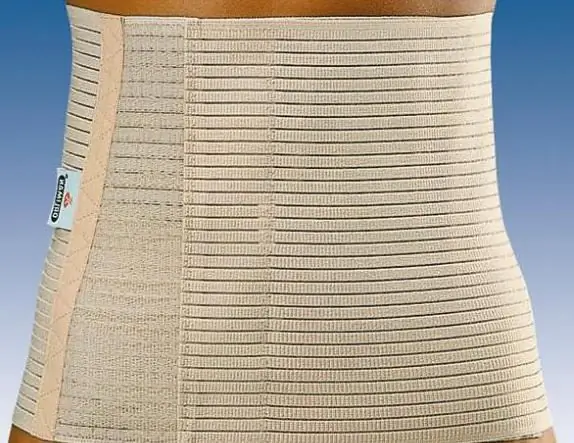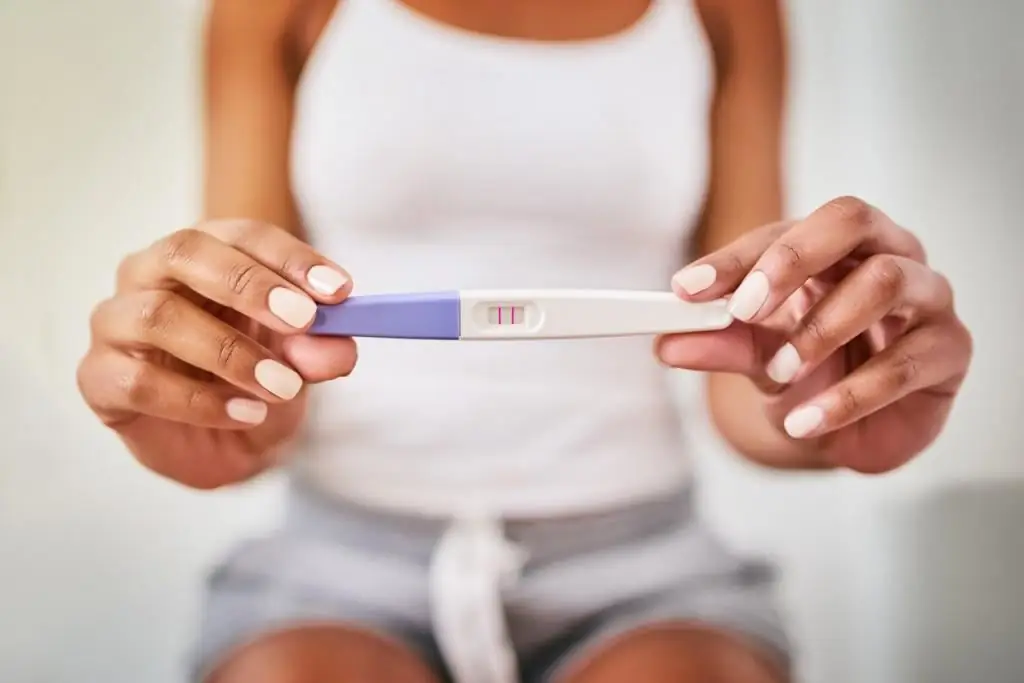2026 Author: Priscilla Miln | miln@babymagazinclub.com. Last modified: 2025-01-22 17:55:26
The desire to have children, to become a mother is natural for a woman. Even if pregnancy is not planned in the near future, it is important to be confident and calm that nothing will interfere with this when the time comes. Is it worth talking about those who are already thinking about replenishing the family? However, unfortunately, the development of medicine has not advanced enough for people to stop getting sick or avoid operations. Surgical intervention for diseases of the reproductive system raises logical questions about the negative consequences of modern methods. How likely is pregnancy after laparoscopy?
What is laparoscopy?

Laparoscopy is a modern low-traumatic method of surgical intervention used to perform operations on organs located inside the abdominal and pelvic cavity. It is carried out using a special tool - a laparoscope, whichis a retractable (telescopic) tube with a set of lenses connected to a video camera. The laparoscope is also equipped with a non-heating light source.
In order to lift the abdominal muscles and create space for action during the operation, the cavity is filled with carbon dioxide. To put it simply, they inflate the stomach.
The advantages of this method are: the minimum area of tissues injured during incision, as a result, the absence of postoperative scars, quick and easy recovery of the body, a short stay in the hospital. The use of digital video cameras on instruments allows you to see the necessary parts of the internal organs in more detail, clearly and from different angles. During laparoscopy, he althy organs remain unaffected.
Disadvantages can be considered the limited movements of the surgeon, the lack of direct tactile contact - you can only work inside with tools, incorrect depth perception when looking through the camera, the "mirror" location of the cutting surface of surgical instruments in relation to the one performing the operation - control of objects moving towards, is unnatural for human nature, so it is more difficult for him to learn and develop appropriate reactions. All this requires more skill and dexterity from the doctor.
Laparoscopy is widely used for a variety of operations - from the removal of the stomach, gallbladder and abdominal hernia, manipulation of the small and large intestines to the fusion of the vertebrae.
Very often this method is used during gynecologicaloperations. It allows surgery even during pregnancy.
Pregnancy after laparoscopy

Since the laparoscopic method is common in modern medicine, the number of patients subjected to such treatment includes many women of childbearing age who have already become mothers and have not finally decided whether they want to repeat this experience again. There are also many who are planning a pregnancy for the first time. In general, thousands of women who care about whether they can give birth in the future.
To answer this question, you can read official medical statistics, analytical review articles, or talk to those who already have experience in this matter, discussing the likelihood of pregnancy after laparoscopy on thematic forums.
Most common gynecological findings for laparoscopy
- Ectopic pregnancy.
- Ovarian obstruction.
- Polycystic ovaries - a pathological change in the structure of the ovaries (the formation of many cysts on the surface) and their functioning.
- Endometriosis is a hormonal disorder that causes tissue characteristic of the mucous membrane of the uterus and its appendages (endometrium) to get outside this area. Or an endometrial cyst formed by endometrial tissue.
- Tumours, polyps.
- Tubal adhesions.
- Infertility.

Is there a link between infertility and laparoscopy
Modern research confirms that such an operation cannot be the cause that prevents pregnancy. Such a surgical intervention can only cure infertility in a number of cases, but it will not change the situation for the worse. If pregnancy does not occur after laparoscopy, then the reproductive function was impaired before and, probably, the problems solved by surgery were not the reason.
In any case, the operation helps to improve the he alth of organs, allows you to get rid of pathological changes, gives more information about the patient's condition.
Occurrence of a normal pregnancy after laparoscopy to remove an ectopic
Ectopic pregnancy is almost always hopeless for the baby and dangerous for the mother. An embryo can settle in the ovary, abdominal cavity, with pathology of the uterus - in its underdeveloped horn, but most likely - in the fallopian tubes. To interrupt it, laparoscopy is most often performed. After an ectopic pregnancy, a normal pregnancy is possible and very likely, even if during the operation the woman loses one of the fallopian tubes or one ovary.
The first month after the operation, doctors recommend completely abandoning attempts to conceive, and then everything is individual. The reviews left by them speak of the successful conception that has occurred in many women. Pregnancy after laparoscopy does not occur immediately. The average period is six months (plus or minus a month). But there are frequent cases when a year or more passed between surgery and pregnancy - many reviews speak about this.

Pregnancy after tubal blockage surgery
Unlike all other women's diseases, tubal obstruction tends to return quickly. Spikes reappear. Therefore, after laparoscopy of the fallopian tubes, pregnancy is advised to plan without delay. It is advisable to wait for a month-long recovery period, then pass all the necessary tests as quickly as possible: using urine and blood samples to identify the general condition of the body, exclude the presence of infections, and also, after passing a smear, check for the presence of microflora and sexually transmitted diseases. In case of favorable results, you should hurry.
Laparoscopy for ovarian disease, endometriosis and tumor removal
Pregnancy after laparoscopy of ovarian cysts of various origins (one or more), after cleaning from endometrial cells of those areas where they are not normally supposed to be and cauterization of foci of endometriosis, after removal of other benign formations, it is often planned only after a few months of recovery period after surgery.
Prescriptions are individual depending on each specific case - the attending physician may prescribe a preliminary hormonal therapy. Especially often this prescription is relevant after laparoscopy of endometriosis, in which pregnancy does not occur due to a malfunction of the endocrine system.
The choice of remedy is determined by the characteristics of the organism and the diagnosis, but in many reviews of patients who have undergone treatment,the names of medicines are repeated, which indicates that domestic specialists trust mainly the same drugs.

What rules to follow to get pregnant sooner after laparoscopy
Despite the fact that there are examples of spontaneous pregnancy after laparoscopy of the ovaries and fallopian tubes, to increase the chances of conception, it is recommended to prepare the body and take into account some tips:
- Don't forget about the importance of menstrual calendar calculations. You need to know when ovulation occurs and plan to conceive in the most likely week of the cycle (directly on the day of ovulation and three days before and after it).
- Keep in mind that not the number of sexual acts plays a decisive role. On the contrary, experts say that sperm quality decreases with too much sex, so one attempt a day during probable ovulation is more than enough.
- You need to take care of your he alth and the general condition of the body - give up bad habits, allocate enough time - about 8 hours a day for sleep, drink a course of vitamins and trace elements (both future parents).
- After intimacy, it is useful for a woman to be at least 15 minutes at rest, preferably in a supine position on her back.

Postoperative Precautions
After laparoscopy of cysts with pregnancy, it is sometimes recommended to wait longer than a month, as this operation is consideredquite difficult, especially on the ovaries, although their functions are restored within about a week.
After laparoscopy of any organs of the reproductive system, some precautions should be observed:
- Refrain from eating and drinking (except for still water) on the first day after the operation.
- Sparing diet in the first month after laparoscopy - refusal of spicy, heavy and fried foods, foods that cause increased fermentation, gas formation. Boiled or steamed food, fermented milk products, natural fruit drinks are recommended.
- Exclusion of heavy physical exertion - from too active dancing to heavy lifting. Also, air travel and long train journeys are not recommended earlier than a month after laparoscopy.
- Until the surgical incisions are completely healed, you should not take baths, visit the pool and swim in open water.
- It is also advisable to postpone sex for 2-3 weeks.

The importance of a positive mindset for the future
In no case should you despair and be especially upset if a medical examination identifies problems in the reproductive system, revealed fibroids, polyps or cysts. After laparoscopy, 85% of operated women become pregnant within the first year.
Reviews from many women who already have a positive experience with laparoscopy confirm that people's thoughts and attitudes matter more than medical statistics. Often it was possible to conceive a child onlyafter the expectant mother stopped making pregnancy the only meaning of existence, she calmed down and began to just live.
Recommended:
Pregnancy after non-developing pregnancy: causes and preventive treatment

A pregnant woman, having learned about the fading of the fetus, experiences a strong nervous shock. In addition, she will have to go through a long process of recovery of the body. Not surprisingly, after the experience, many women have a fear of a new pregnancy after an undeveloped pregnancy. Therefore, it is important to study the possible causes of the development of pathology and try to avoid them in the future
How many days can I get pregnant after my period? How fast can you get pregnant after your period? Chances of getting pregnant after period

Pregnancy is a crucial moment for which every woman wants to be ready. To determine the probable moment of conception, it is necessary to know not only the time of ovulation, but also some features of the human body
How to wear, how much to wear and whether to wear a bandage after childbirth? The best bandage after childbirth: reviews, photos

The due date is approaching, and every woman begins to wonder how she will look after her baby leaves her cozy house. Most often, they immediately remember about the bandage after childbirth
Pregnancy after a missed pregnancy: how long does it take, how does it proceed?

A pathological condition in which the dead fetus continues to be in the uterine cavity is called missed pregnancy. It is very difficult for a woman who has undergone such a condition, both physically and psycho-emotionally. Many lose hope and faith in a favorable outcome of the next pregnancy after a dead one. Pregnancy and childbirth will certainly be successful if you follow all the doctor's recommendations and do not give up
Signs of pregnancy a week after conception: symptoms, instructions for using a pregnancy test, consultation with a gynecologist and a woman's well-being

Women who dream of having a baby want to know about the onset of pregnancy even before the delay in menstruation. Therefore, expectant mothers can already notice the first signs of pregnancy a week after conception. The article will discuss the signs of pregnancy a week after the act, how to properly use a pregnancy test and when to make an appointment with a doctor

